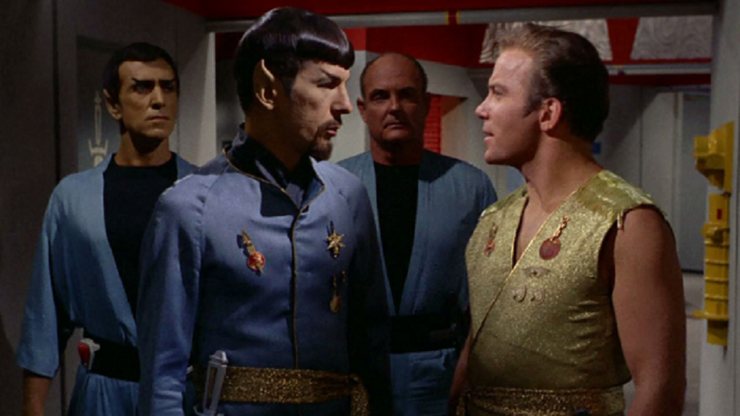Some days, it feels like we’re living in an alternate reality. It’s like we’ve slipped through some mysterious portal and ended up in a world where powerful governments fumble pandemic responses. A world where demagogues make moral arguments that place profits over people. A world more cruel than the one we thought we knew.
Alternate realities have always been constant in genre storytelling, from Thomas More’s Utopia to the DC Universe’s Earth 3. These stories let us examine our fundamental beliefs in a new and unfamiliar context, to test the character of our heroes in radically different situations. For that reason, the Mirror Universe of the Star Trek franchise remains one of the most compelling alternate reality conceits.
Where the Star Trek Prime and Kelvin Universes imagine an optimistic future in which humanity has overcome racism, capitalism, and sexism to take its place in the United Federation of Planets, the Starfleet of the Mirror Universe serves the fascist Terran Empire. As introduced in the 1967 episode “Mirror, Mirror,” in which a transporter accident sends Captain Kirk (William Shatner) and three bridge officers to the Mirror Universe, the Terran Empire strives for human supremacy and rewards barbarism.
Since that episode, the Mirror Universe has been an important part of Star Trek, serving as the setting for five episodes of Deep Space Nine (1993-1999), a memorable two-parter in Enterprise (2001-2005), and most of Discovery’s (2017- present) first season.
Mirror Universe episodes not only allow beloved actors to ham it up as their normally virtuous characters’ evil twins, but also give us an opportunity to interrogate Federation ideals. In these difficult days, Mirror Universe episodes can teach us the value of holding onto hope at all costs, and to keep fighting for our beliefs.
Lesson One: Stay Smart
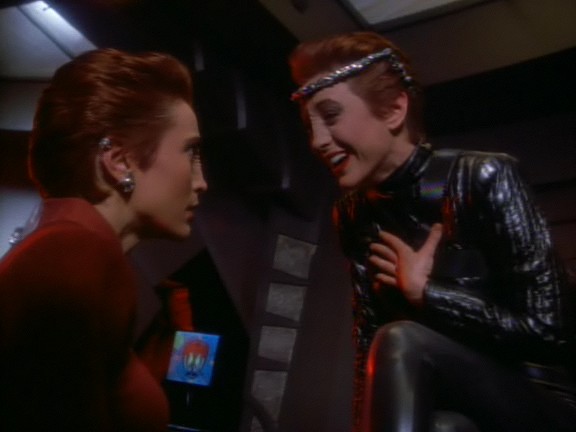
Information means the difference between life and death for those thrust into the Mirror Universe. Characters arriving from the Prime Universe must quickly differentiate between the norms of the world they know and the values at the heart of this cruel reality.
The first DS9 MU episode, “Crossover,” demonstrates this point. When Dr. Bashir (Alexander Siddig) and Major Kira (Nana Visitor) find themselves in the MU 100 years after Kirk’s trip, they discover that humans have been enslaved by an alliance of Bajorans, Klingons, and Cardassians. Their insistence on treating MU inhabitants like their Prime counterparts puts Kira face-to-face with her sadistic counterpart Intendant Kira and earns Bashir a spot in the mining crew.
Other characters model wiser behavior, as when Kirk orders his crewmen to play along with Mirror Spock (Leonard Nimoy) until they can get away from Terrans and do some research. When Specialist Michael Burnham (Sonequa Martin-Green) and her USS Discovery crewmates cross over, they take time to research their counterparts in the Terran Empire. Staying smart and employing basic fact-finding spares Burnham and Kirk from the fates of Kira and Bashir.
The same is true for our reality. Every day, we’re bombarded with new information, not all of it trustworthy. Like Kirk and Burnham, we need to keep our wits about us: consider the sources, count the cost, and operate according to the most sound theories.
Lesson Two: Look For Friends
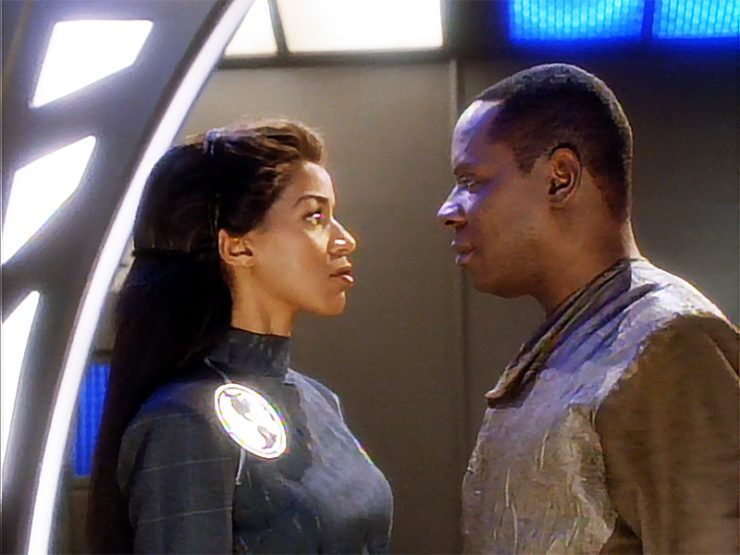
Despite their dystopian worldviews, Mirror Universe characters have the same basic personality traits as their Prime doubles. Under his menacing goatee, a logical Vulcan mind still drives Mirror Spock. Even without his enlistment or family, Miles “Smiley” O’Brien (Colm Meaney) of the MU remains a resourceful engineer. More interested in torture than healing, Mirror Phlox (John Billingsley) retains his vast knowledge of humanoid biology.
Because of these similarities, visitors can appeal to the better nature of their MU friends and counterparts. In the DS9 episode “Through the Looking Glass,” Benjamin Sisko (Avery Brooks) teams with Smiley and with the Mirror version of his late wife Jennifer (Felecia M. Bell) by drawing from his connections to their Prime analogues. Likewise, Michael Burnham enlists the help of Mirror versions of her first officer Saru (Doug Jones) and her former captain Phillipa Georgiou (Michelle Yeoh).
Difficult times can change us, making us all a little more desperate and selfish. But the characteristics that bind us to our friends and loved ones never completely disappear. As Sisko and Burnham show, those connections mean more in dire circumstances.
Lesson Three: Find New Friends (even if they used to be enemies)
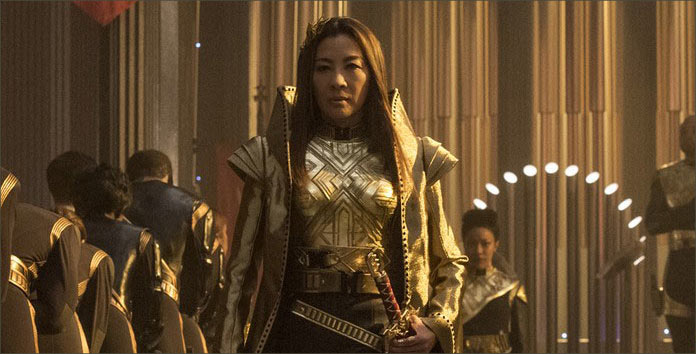
At the same time, the changes encountered within the Mirror Universe allow for new and unlikely alliances.
The Discovery episode “The Wolf Inside” best illustrates this point, in which Prime Burnham, posing as her MU doppelgänger, is sent to assassinate members of the anti-Terran Alliance. Upon learning that the Alliance is lead by Mirror Voq (Shazad Latif), the counterpart of a Klingon waging war against the Federation in the PU, Burnham seeks out a partnership. Putting aside the hostility she feels toward his Prime double, Burnham befriends Mirror Voq and gains valuable information to help face her battle at home.
Burnham succeeds because she realizes that we need more friends and connections as challenges mount—past grudges and hurt should not prevent us from expanding and enriching our communities.
Lesson Four: Stand By Your Values
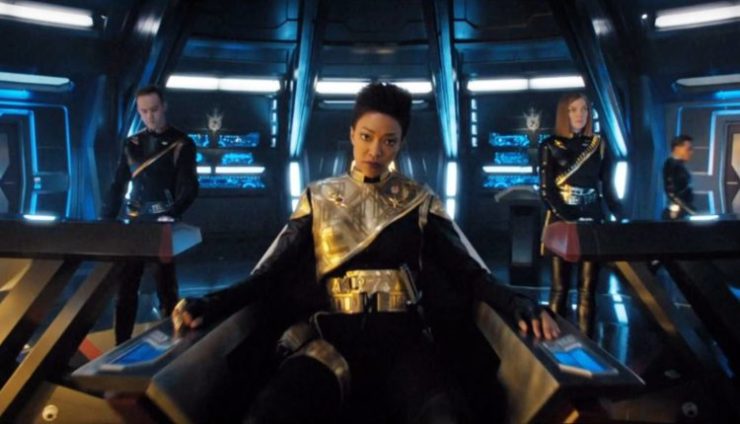
In the last DS9 Mirror episode, “The Emperor’s New Cloak,” Ferengi Quark (Armin Shimerman) and Rom (Max Grodénchik) must crossover from the Prime Universe to rescue Grand Nagus Zek (Wallace Shawn). How did the Nagus end up in the Mirror Universe? He went there willingly, looking to establish new trade partners. Foolish as that might be, you cannot deny that Zek kept his values in the MU.
We see more inspiring examples in the other MU stories, as when Burnham meets Mirror version of her Kalpian officer Saru. Even though her survival depends on her ability to pass for her Mirror equivalent, Michael refuses to follow the Terran Empire’s custom of enslaving Kelpians. Instead, she treats him with dignity, speaking to him kindly and calling him by his name. Even in the MU, Burnham holds to the conviction that all beings deserve respect.
In difficult times, it’s tempting to let our beliefs slip, to let the norms of a new reality define us. Burnham (and, in his own way, Zek) reflect the need to be true to ourselves and our own humanity, especially in bleak situations. The tides of oppression will turn only when we hold steadfast to our values.
Lesson Five: Hold on to Hope
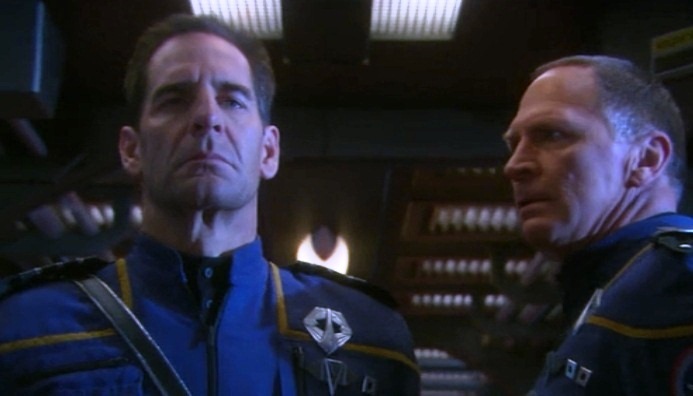
The Enterprise two-parter “In a Mirror, Darkly” is the only MU story to feature no Prime Universe characters. Instead, it tells of the early days of the Terran Empire, opening with a variation on a scene from the 1996 film Star Trek: First Contact: the first meeting between Vulcan explorers and the human inventor of the Warp Drive, Zefram Cochrane (James Cromwell). Where Prime Cochran shook the hand of his alien visitors, the Mirror Cochran responds to the Vulcan salute by murdering the aliens.
By choosing fear over acceptance, Cochran sets the tone of the MU, with which all future explorers from the PU must contend. But every MU story also insists that this brutal way of life cannot hold. “In a Mirror, Darkly” powerfully proves this point, ending with the murderous schemer Mirror Archer (Scott Bakula) undone when Mirror Sato (Linda Park) uses those methods against him.
And even as they show us that cruelty will ultimately fail, MU episodes insist that hope cannot be quenched. At the climax of “Mirror, Mirror,” Kirk turns to Mirror Spock and makes a desperate appeal to logic, reasoning that power for the sake of power always leads to self-destruction. Later, Sisko’s decency makes Smiley O’Brien into a more compassionate leader in the MU. Michael Burnham brings Mirror Georgiou to the Prime Universe to show her there’s a better way to live.
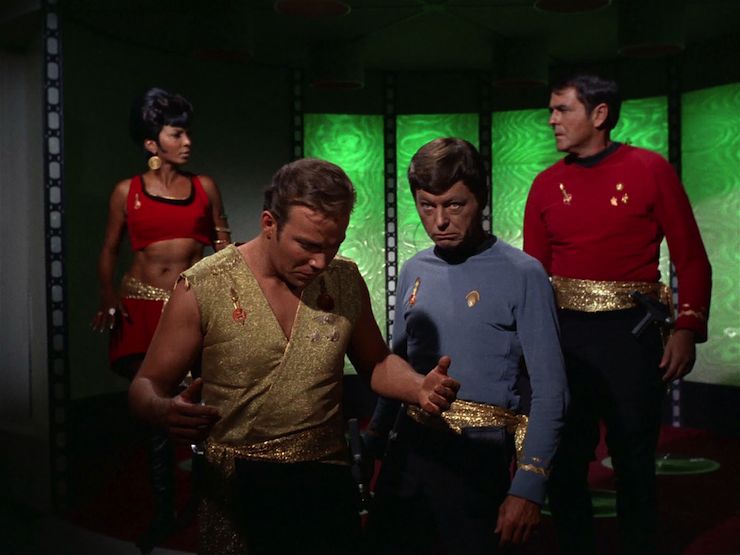
These instances demonstrate the most important lesson of Mirror Universe stories, and perhaps of every Star Trek story: no matter how bleak things seem, no matter how badly humans treat one another, we can always change for the better; healing and redemption are always possible. We use that hope to keep working toward a future where we no longer compete with one another and allow divisions to define us, but treat each other with dignity and strive to better the lives of all.
That’s a story we need now more than ever.
Joe George‘s writing has appeared at Think Christian, FilmInquiry, and is collected at joewriteswords.com. He hosts the web series Renewed Mind Movie Talk and tweets nonsense from @jageorgeii.










